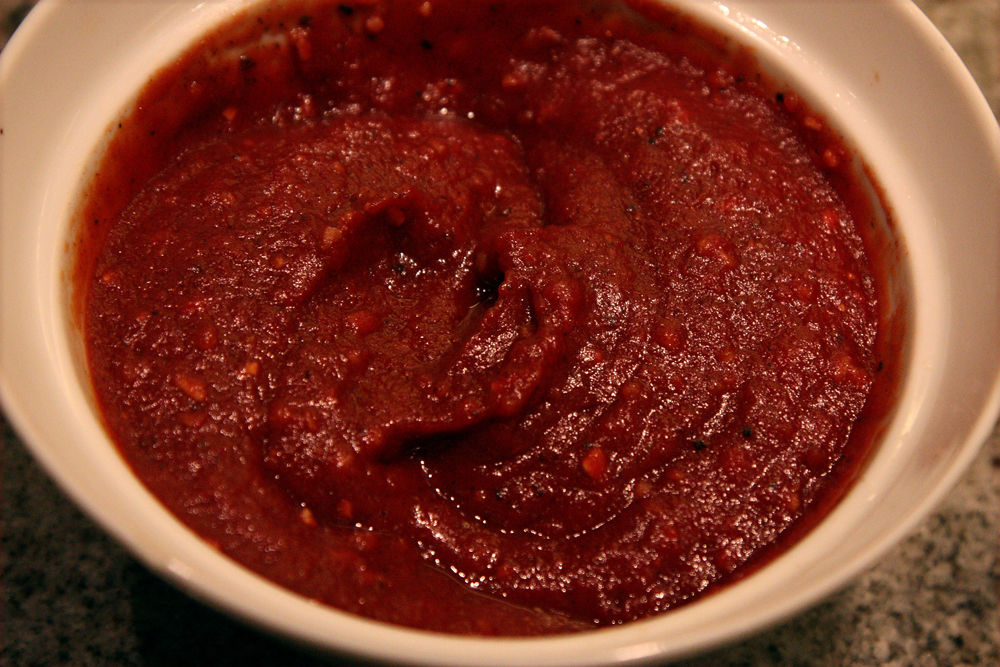 I’m not sure about the spelling—and anyway, both of those, even the organic versions you find in the “health food” isle, are loaded with unhealthy forms of sugar—far too much of it! May as well title this page Corn syrup? or Cane sugar?
I’m not sure about the spelling—and anyway, both of those, even the organic versions you find in the “health food” isle, are loaded with unhealthy forms of sugar—far too much of it! May as well title this page Corn syrup? or Cane sugar?
This wonderful ketchup recipe version uses a small amount of maple syrup and has greatly reduced total sugar from what you find in commercial products.
It continues to surprise me how many people understand that corn syrup, especially the high fructose kind, is bad for our health while those very same people think that sugar cane, cane sugar, turbinado sugar, raw cane sugar and/or it’s evaporated cane syrup are somehow better. Amazing. All these sugars are actually the same as far as what sort of sugar you are getting—sucrose—and the inflammatory, blood sugar-elevating, stimulate the liver to produce fat (read: you gain weight), and the energy surge/slump effects caused by sugars from the cane and corn plants (and actually agave it is turning out). Sugar forms may differ in minerals, amino acids, proteins, active enzymes and even vitamins (if they have any left after being processed and pasteurized) but corn sugar and cane sugar in any form are a straight shot at poor health.
Numerous studies have shown that corn syrup (a refined sugar made from corn starch that may even come from GMO corn, although industry claims the truth is proprietary) as well as the sugar derived from the stalk of the cane plant, will promote inflammation. In fact, Dr. Malcom Peet showed that refined sugar (as well as dairy) consumption predicted mental health problems such as depression and schizophrenia. Wow! And he found this true for both corn sugar and cane sugar.
In other words, sugar derived from the sugar cane plant is no different than sugar derived from the corn plant: they are both bad for your health. They are, however, amazingly cheap to produce. In fact, sugar cane was a weed-turned-crop whose production is turning rain-forested islands and mainland areas into sugar cane plantations from Brazil to Uganda. Corn is even cheaper, mostly because it is subsidized by your U.S. tax dollars.
You absolutely need to maintain blood glucose levels as an energy source for your brain. However, eating refined sugars or carbohydrates to accomplish this is a bad idea: that causes a fast spike of blood sugar, followed by a rise in insulin, and repeated often enough will cause all manner of unhealth.
Yet our consumption of corn and cane sugar over the past 5 decades, has increased exponentially–mostly because it is now added to almost all prepared foods, a trend coinciding with the emergence of the obesity epidemic. Why? When you eat, the simple sugars and then the starches (which rapidly are digested into simple sugars) must either be used right away for energy or converted by the liver first into glycogen until those stores are full and then rest into fat. But, our special corn sugar friend fructose, however, apparently bypasses the normal two-step conversion pathway and signals the liver to create and store fat whether or not there are adequate glycogen stores. This is double trouble spelled as low energy (no energy stores) and weight gain.
Maple syrup and raw honey appear to be very different. Recent research by the University of Rhode Island sheds light on why maple syrup has so many health benefits. Researcher Navindra Seeram, who specializes in medicinal plant research, has found more than 20 compounds in maple syrup that have positive effects on human health, including boosting the body’s ability to remove toxic substances.
Want to stay thin or just lose some weight? Start by eliminating cane sugar and corn sugar from your diet. And whatever you do, just don’t call either one a healthy choice.
We use organic for all these ingredients except maybe the spices. And by the way, it is a pretty good assumption that high quality maple syrup is organic or at least not full of bad stuff even if the farmer didn’t get that certification. it is the whole sap from the maple tree, water slowly removed.
Makes about ½ cup
Ingredients
6 oz can organic tomato paste
¼ cup apple cider vinegar
¼ cup maple syrup
1 Tbs dehydrated onion flakes
½ tsp ground cloves
½ tsp salt
½ pepper
dash cinnamon
Preparation
Combine all ingredients in a bowl and whisk together until blended well.
Can be stored for about a week in the refrigerator.
Enjoy!
Powered by










Hi there health colleagues, how is all? This post is remarkable for me. I’m glad to know about options to high sugar and junk in condiments. Thank you Marie!